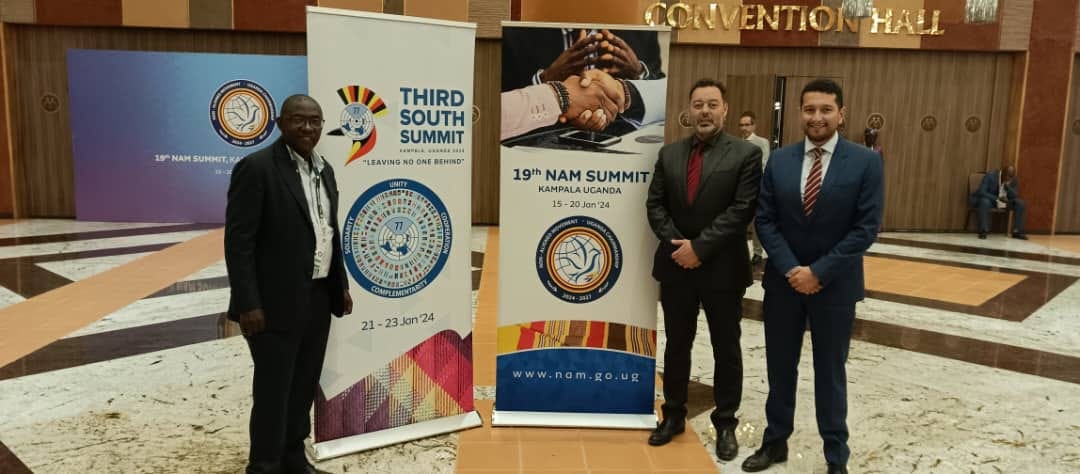Good morning from Kampala!
This week Uganda is not only the Pearl of Africa, but also the symbolic capital of the Global South. Uganda is hosting the 19th Non-Aligned Movement Summit (Jan 15-20) and the G77+China Third South Summit (Jan 21-23) at Speke Resort & Convention Center Munyonyo. I have written about Uganda’s leadership role in the Global South during after my last visit to Kampala back in November in preparation for the South Summit. Coincidentally (or not), while Global South countries gathered to discuss South-South cooperation and how to face the challenges of debt, development and climate change, others turned their attention to Davos, Switzerland where global business elites summoned government officials and leaders of global financial institutions to influence global economic thinking in a way that serves and protects their interest, while pretending to care about inequality, poverty, and climate change.
I had the pleasure of reuniting with my dear colleagues Julius Mucunguzi from Uganda (left) and Andrés Chiriboga from Ecuador (right) to continue our research and policy collaboration on debt, development and South-South strategic cooperation, which I have written about last November when we all gathered on the other side of the planet in Quito, Ecuador.
Targeted, transformative, radical, and at-scale
These are the keywords that I used to open my remarks on development and climate finance at a High-Level Seminar co-hosted by UNCTAD and the governments of Uganda and China under the theme of “Enhancing Economic Resilience through broader South-South Economic Cooperation.” The event was moderated by Richard Kozul-Wright (Director, Division on Globalization and Development Strategies, UNCTAD) and began with opening speeches by H.E. Rebeca Grynspan (Secretary-General, UNCTAD), H.E. Miao Deyu (Assistant Foreign Minister, China), and H.E. Yoweri Kaguta Musenveni (President, Uganda).
I spoke at a roundtable on reforming international financial architecture to scale up development and climate finance for the Global South, which included H.E. Mr. Pedro Luis Pedroso Cuesta (Permanent Representative at the UN, Cuba), Ms. Hanan Morsy (Deputy Executive Secretary, UNECA), Mr. Francis Ogwang (Country Manager, East African Development Bank, Uganda), and Ms. Yuefen Li (Senior Advisor on South-South Cooperation and Development Finance, South Centre).
Development and climate finance must be targeted towards strategic sectors such as agriculture, energy, and high value-added manufacturing that prioritizes clean energy, clean cooking, and clean transportation infrastructure for use in the Global South rather than for export; transformational, so that the focus is on food sovereignty and agroecology (core crops, rather than cash crops), renewables rather than fossil fuels (aka stranded assets), radical in the literal sense of the term, going to the roots of the problems rather than the usual bandaid solutions, false solutions, and dangerous distractions, focusing on adaptation rather than just mitigation; and at-scale rather than the usual and painfully slow, gradual, and incremental approach of the past.
I highlighted that the G77+China as a block effectively controls almost the entire global supply of strategic minerals that form the basis for the clean-tech and high-tech 21st century industries. Countries such as China and India have the manufacturing base for the entire value-chain that can be replicated and scaled up via South-South strategic cooperation, transfer of technology, joint-ventures, regional industrial policies to manufacture and deploy the building blocks of development and prosperity that would allow the Global South to leapfrog and reposition itself more favorably in the global economy and escape the colonial traps of extractivism and bottom of the global value-chain.
Finally, I closed my intervention by emphasizing that the Global South must decolonize the global economic architecture rather than just “reform” the financial architecture. The global economic architecture includes finance, trade, investment and taxation architectures, all of which was not designed by us, not designed for us, so it cannot be the same architecture that will deliver development, prosperity and justice for the Global South. More importantly, nobody at Davos is going to redesign or build this new architecture for us. It is incumbent upon us to build the alternative architecture that will actually work for us.
This year marks the 60th anniversary of the creation of both UNCTAD and the G77+China. It was also a wonderful opportunity to catch up with my colleague and mentor H.E. Rebeca Grynspan, Secretary-General of UNCTAD, and to share perspectives about important challenges and opportunities facing the Global South.
The UNCTAD high-level seminar concluded with an excellent roundtable discussion on promoting South-South trade, investment, and industrial cooperation through regional initiatives, with H.E. Mwebesa Francis (Minister of Trade Industry and Cooperatives, Uganda), H.E. Kerrie D. Symmonds (M.P.Minister of Foreign Affairs and Foreign Trade and Senior Minister coordinating the Productive Sector, Barbados), H.E. Rob Davis (Former Minister of Trade and Industry, South Africa), and Ms. Dima Al-Khatib, Director, UN Office for South-South Cooperation).
Overall, the gathering offered several opportunities to discuss the strategic policy options that came out of the Just Transition report (published by the Independent Expert Group on Just Transition & Development, 2023) with several ministers, ambassadors, heads of delegations from several countries including Tunisia, Uganda, Zambia, Namibia, South Africa, Iran, Rwanda, Venezuela, Bolivia, Lesotho, Cuba, and Tanzania to mention a few.



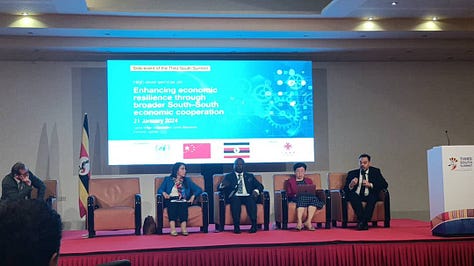
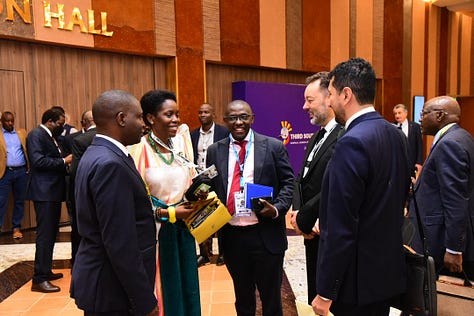
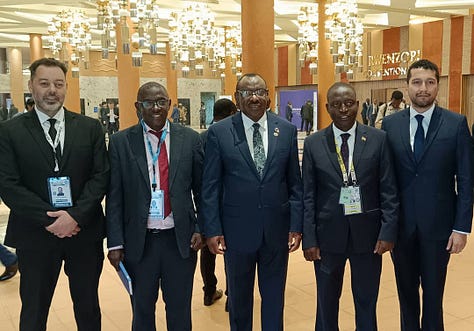
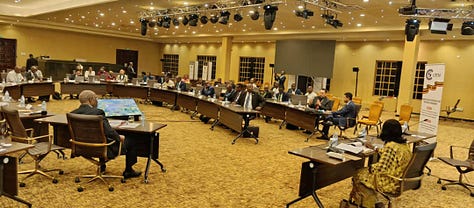
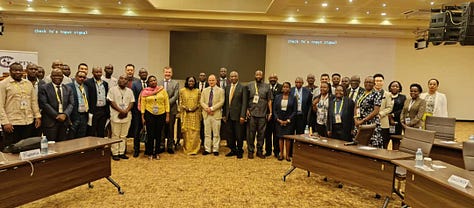
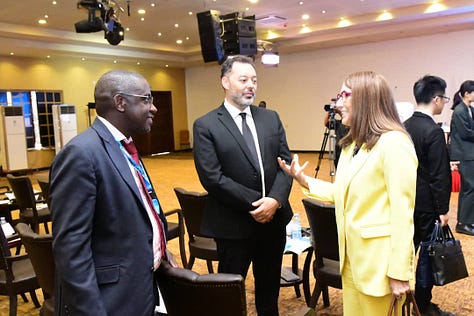
Fadhel Kaboub is an associate professor of economics at Denison University (on leave), and the president of the Global Institute for Sustainable Prosperity. He is also a member of the Independent Expert Group on Just Transition and Development, and serves as senior advisor with Power Shift Africa. He has recently served as Under-Secretary-General for Financing for Development at the Organisation of Southern Cooperation in Addis Ababa, Ethiopia. Dr. Kaboub is an expert on designing public policies to enhance monetary and economic sovereignty in the Global South, build resilience, and promote equitable and sustainable prosperity. His recent work focuses on Just Transition, Climate Finance, and transforming the global trade, finance, and investment architecture. His most recent co-authored publication is Just Transition: A Climate, Energy, and Development Vision for Africa (May 2023, published by the Independent Expert Group on Just Transition & Development). He has held a number of research affiliations with the Levy Economics Institute (NY), the John F. Kennedy School of Government at Harvard University (MA), the Economic Research Forum (Cairo), Power Shift Africa (Nairobi), and the Center for Strategic Studies on the Maghreb (Tunis). He is currently based in Nairobi, Kenya and is working on climate finance and development policies in Africa. You can follow him on Twitter @FadhelKaboub and you can read his Global South Perspectives on substack where he blogs regularly.





